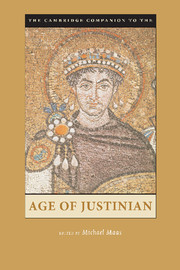Book contents
- Frontmatter
- Part 1 Structures and Ideologies of Empire
- 1 Roman Questions, Byzantine Answers
- 2 Economy and Administration
- 3 Justinian’s Constantinople
- 4 The Classical City in the Sixth Century
- 5 The Empire at War
- 6 Mediterranean Plague in the Age of Justinian
- 7 Law and Legal Practice in the Age of Justinian
- 8 Justinianic Ideology and the Power of the Past
- Part 2 Religion and Philosophy
- Part 3 Literature and the Arts
- Part 4 Peoples and Communities
- Bibliography
- Index
- Plate Section 1
- Plate Section 2
8 - Justinianic Ideology and the Power of the Past
from Part 1 - Structures and Ideologies of Empire
Published online by Cambridge University Press: 28 May 2006
- Frontmatter
- Part 1 Structures and Ideologies of Empire
- 1 Roman Questions, Byzantine Answers
- 2 Economy and Administration
- 3 Justinian’s Constantinople
- 4 The Classical City in the Sixth Century
- 5 The Empire at War
- 6 Mediterranean Plague in the Age of Justinian
- 7 Law and Legal Practice in the Age of Justinian
- 8 Justinianic Ideology and the Power of the Past
- Part 2 Religion and Philosophy
- Part 3 Literature and the Arts
- Part 4 Peoples and Communities
- Bibliography
- Index
- Plate Section 1
- Plate Section 2
Summary
For [Justinian[, being by nature an innovator and covetous of whatsoever does not belong to him, unable to abide by what is established, has longed to take over the entire earth, and has been striving to bring every kingdom into his power.
(Procopius, Wars, 2.2.6).The words in the epigraph are the testimony of hostile witnesses, attributed by Procopius of Caesarea to envoys of the Ostrogothic king of Italy who have arrived at the court of Sasanid Persia in order to enlist support against Justinian’s efforts to reconquer Italy. Procopius himself qualifies these words in an aside: “[The Gothic envoys[ were bringing as indictments against Justinian such things as would seemingly be encomiums for a worthy emperor, since he was striving to make his realm greater and much more splendid” (Wars, 2.2.14). While the historian discounts the motives of the speakers bringing the charges, his judgment as to the substance of the charges themselves is carefully nuanced. The very accomplishments that in the hands of Justinian’s enemies supply material for invective, he states, might serve as the stuff of panegyric if viewed in a sympathetic light.
Justinian was a controversial and contradictory figure, whose policies and methods of self-presentation both attracted and repulsed contemporary observers. Two charges laid at Justinian’s feet by the Gothic envoys are particularly relevant for the discussion that follows. The emperor is both an inveterate “innovator” and hostile to “what is established” – essentially two sides of the same coin.
- Type
- Chapter
- Information
- The Cambridge Companion to the Age of Justinian , pp. 185 - 212Publisher: Cambridge University PressPrint publication year: 2005
- 10
- Cited by

